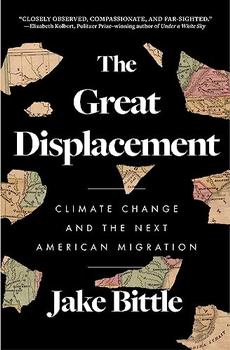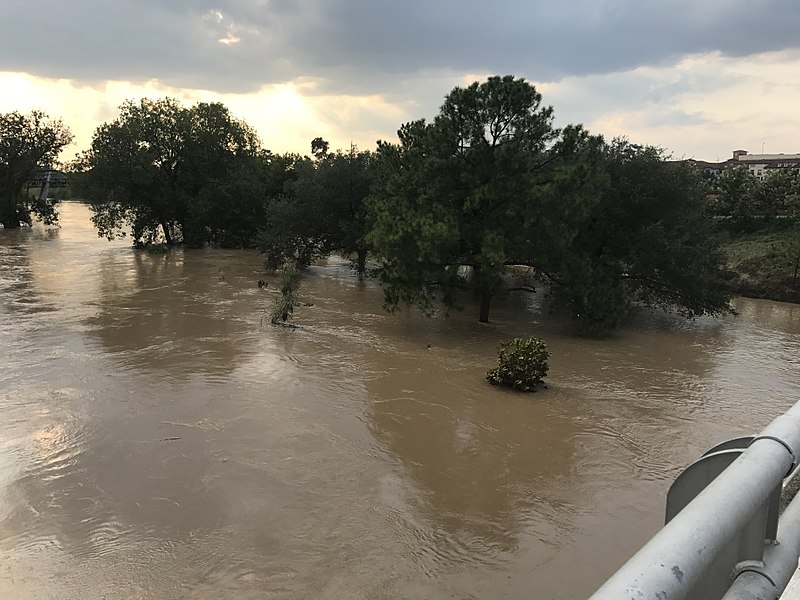Summary | Excerpt | Reviews | Beyond the Book | Read-Alikes | Genres & Themes | Author Bio

Critics' Opinion:
Readers' Opinion:
First Published:
Feb 2023, 368 pages
Paperback:
Feb 2024, 368 pages
 Book Reviewed by:
Book Reviewed by:
Elisabeth Herschbach
Buy This Book
This article relates to The Great Displacement
 In 2017, Hurricane Harvey dumped more than 50 inches of rain on Houston, Texas. It was the biggest rainstorm in United States history and the third major storm of its kind to hit the city in as many years. Huge swathes of Houston and its surrounding suburbs were submerged. Floodwater laced with toxic runoff, sewage and debris inundated streets and sidewalks, damaging hundreds of thousands of houses and buildings. Tens of thousands of people were forced from their homes. Three years later, almost 20% of those displaced were still in temporary housing.
In 2017, Hurricane Harvey dumped more than 50 inches of rain on Houston, Texas. It was the biggest rainstorm in United States history and the third major storm of its kind to hit the city in as many years. Huge swathes of Houston and its surrounding suburbs were submerged. Floodwater laced with toxic runoff, sewage and debris inundated streets and sidewalks, damaging hundreds of thousands of houses and buildings. Tens of thousands of people were forced from their homes. Three years later, almost 20% of those displaced were still in temporary housing.
As sea levels rise and the atmosphere heats up due to climate change, extreme storms like Hurricane Harvey are becoming more frequent, causing bigger downpours, more flooding and greater devastation. But as Jake Bittle explains in The Great Displacement, the disasters that ensue are not the effect of climate change alone. Rather, the magnitude of devastation is often determined by human causes. Factors such as where and how we build communities, as well as preexisting social disparities like unequal access to resources, can exacerbate the effects of natural disasters and make it harder to recover from them.
In Houston, decades of virtually unregulated development have created an urban environment massively ill-equipped to cope with extreme weather. Thousands of houses were built in flood zones, the areas at highest risk of flooding. Creeks and rivers were filled in with dredged-up dirt to make way for a concrete sprawl of buildings, disrupting the landscape's natural water flows. Practically every inch of the surrounding prairie land was plowed up and paved over, destroying the native grasses and soil that once absorbed excess rainwater.
Flawed urban planning that failed to account for the new realities of climate change has left Houston at perennial risk of flooding from increasingly violent storms. For lower-income households and communities of color, the risk is magnified by social and economic inequalities in a city deeply stratified along lines of race and class. Black residents are disproportionately likely to live in flood-prone areas—the legacy of discriminatory housing practices that pushed marginalized groups into less desirable locations. And while many wealthier, whiter neighborhoods have flood walls, levees and sophisticated drainage systems to handle stormwater, many low-income and historically Black neighborhoods have inadequate infrastructure, including no drainage systems at all other than crude, open ditches that are quickly overwhelmed by torrential rains.
As a result, while Harvey hit all of Houston hard, predominantly Black, Hispanic and low-income neighborhoods experienced the worst flooding and devastation—an outcome mirrored on the national level. In states across the country, people of color are more likely than the overall population to live in flood-prone areas with the highest level of flood risk. At the same time, the nexus between race, poverty and inequality that puts these communities disproportionately in harm's way also makes it hardest for them to get back on their feet once disaster strikes.
Reflecting on this dynamic in The Great Displacement, Bittle considers the plight of a different town that, like Houston, illustrates the unequal way climate risks are distributed in society—Lincoln City, North Carolina, a historic Black neighborhood founded in the wake of emancipation by a preacher's son on flood-prone swampland white landowners didn't want. "The prime culprit," Bittle writes, "is not nature or even climate change, but the many-stranded racism of American society, the silent hierarchy that divides land along lines of race and class."
Floodwater from Hurricane Harvey, 2017
Photo by urban.houstonian (CC BY 2.0)
Filed under Society and Politics
![]() This "beyond the book article" relates to The Great Displacement. It originally ran in March 2023 and has been updated for the
February 2024 paperback edition.
Go to magazine.
This "beyond the book article" relates to The Great Displacement. It originally ran in March 2023 and has been updated for the
February 2024 paperback edition.
Go to magazine.




The only completely consistent people are the dead
Click Here to find out who said this, as well as discovering other famous literary quotes!
Your guide toexceptional books
BookBrowse seeks out and recommends the best in contemporary fiction and nonfiction—books that not only engage and entertain but also deepen our understanding of ourselves and the world around us.